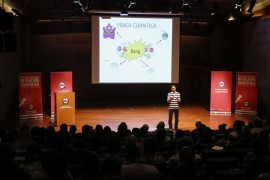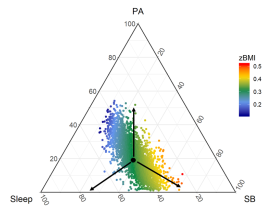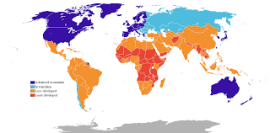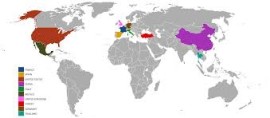- Fecha(s): 30/05/2022
- Lugar: Instituto Centro de Investigación Operativa (Universidad Miguel Hernández). Se grabará.
- Ponente: Agustí Segarra Blasco

La investigación científica y la divulgación, esto es poner al alcance de un público más amplio son dos caras de una misma moneda, pero no es lo mismo. Entre los científicos y también entre los economistas encontramos a grandes investigadores que con el paso de los años también se han convertido en divulgadores muy populares…
- Fecha(s): 25/11/2021
- Lugar: Seminario del Departamento de Métodos Cuantitativos para la Economía y la Empresa
- Ponente: Gabriel Brida. Universida de la República (Uruguay)

This study models the relative expenditure of tourists in terms of budget allocation as a function of a set of co-variables. The purpose is to model how the tourist distributes its budget among the different items, what are the characteristics of the tourist that infer a certain relative spending pattern and if this pattern has…
- Fecha(s): 08/03/2021
- Lugar: Videoconferencia vía Zoom (se proporcionará el link a la sesión través del Aula Virtual)
- Ponente: Hassan Aly

While all research and data collections in the past year has been focused on the damaging impact of Covid19 on the national and international level, as an unprecedented phenomenon that is greater in its negative magnitude than the great depression of 1929-33, this project is centered around the other side of the coin. We will…
- Fecha(s): 11/02/2021
- Lugar: Videoconferencia vía Zoom (se proporcionará el link a la sesión través del Aula Virtual)
- Ponente: Ottaviano Canuto

The growth and productivity performance of emerging market and developing economies since the 2008 global financial crisis failed to repeat the achievements of the previous decade. Besides frustrating expectations that they might become the new growth pole in the global economy, their convergence to per capita incomes of advanced economies has suffered a setback. Nonetheless,…
- Fecha(s): 01/02/2021
- Lugar: Seminarios online CIO: http://cio.edu.umh.es/seminariosonline/
- Ponente: Shashiryar Nasirov (Universidad Adolfo Ibáñez, Santiago de Chile)

A rapid expansion of renewables in the Chilean energy matrix, mostly thanks to exceptional solar and wind resources, combined with a rapid decrease in the cost of renewable energy technologies, intensified current policy debates to reduce the role of coal, which is the largest source of CO2 emissions in the generation mix. Recently, the main…
- Fecha(s): 15/06/2020
- Lugar: SEMINARIOS ONLINE CIO (UMH): http://cio.edu.umh.es/seminariosonline/ (Se grabará)
- Ponente: Marco A. López Cardá, Catedrático de Estadística e Investigación Operativa, (Universidad de Alicante.

En esta presentación se analizan las diferentes razones que contribuyen a que las Matemáticas se encuentren, hoy en día, en un primer plano de actualidad. Destacaríamos, en primer lugar, su presencia, como lenguaje y herramienta fundamental, en todas las ciencias (incluidas las sociales) y ramas de la tecnología. Nos detendremos en temas específicos en los…

Under spatial product differentiation and product design, we identify conditions for either excessive or insufficient firm entry. We extend previous settings, based on the Salop circular model, to analyze the combined role of positive demand elasticity and endogenous targeted product design. First, we show that, given the number of firms, the equilibrium level of targeted…
- Fecha(s): 07/11/2019
- Lugar: Seminario del Departamento de Métodos Cuantitativos para la Economía y Empresa, UMU.
- Ponente: Gabriel Brida. Universidad de la Republica (Uruguay)

Abstract: In this paper we study the dynamics of economic growth and tourism evolution for 97 countries during the period 1995-2016. The variables representing economic and tourism growth are growth rates of per capita GDP and international tourism arrivals. Using the concept of economic regime, we introduce a notion of distance between the dynamical paths…
- Fecha(s): 07/11/2019
- Lugar: Seminario del Departamento de Métodos Cuantitativos para la Economía y Empresa, UMU.
- Ponente: Sandra Zapata Aguirre. Universidad de la Republica (Uruguay)

Se presentarán resultados preliminares del proyecto de investigación (en curso) que lleva el mismo nombre de la ponencia. En Uruguay, poco se sabe sobre la satisfacción laboral en el empleo turístico y ciertas variables interrelacionadas como el compromiso con el trabajo o la intención de abandonar el trabajo. Este estudio plantea como elemento novedoso en…

The relocation of production and exports from the North to the South has been a central feature of economic globalization. Using data on approximately 5,000 products, this paper describes this process over the 1996-2014 period and assesses its impact on cross-country growth. Although increased competition from lower income countries tended to have a significant negative…











